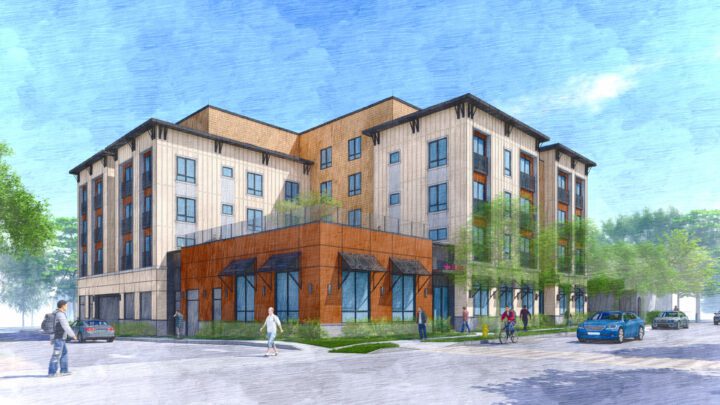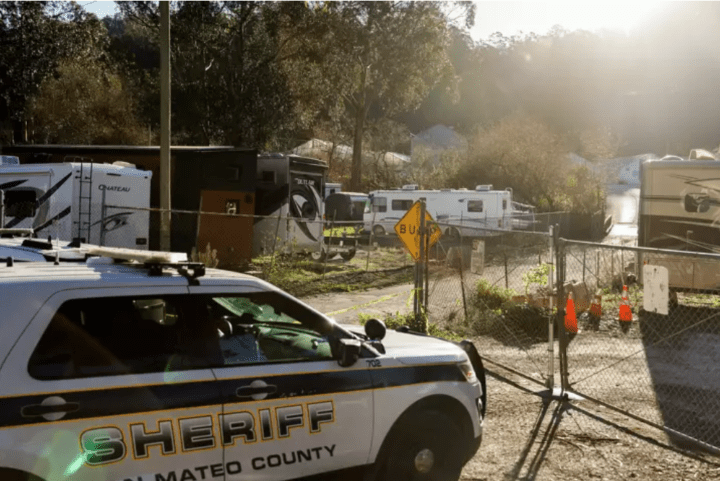Posted on: May 17, 2024
Source: San Francisco Chronicle
By

A rendering of the proposed housing project for farmworkers at 555 Kelly St. in Half Moon Bay. Van Meter Williams Pollack LLP
Ten days after being admonished by Gov. Gavin Newsom for twice delaying approval of 40 units of senior farmworker housing in downtown Half Moon Bay, the city’s Planning Commission reluctantly approved the project late Tuesday night, although board members made it clear they were unhappy with everything from the development’s height to its design to its programming.
With midnight approaching, after five hours of questions and deliberation, the commission voted that the project should be exempt from a stringent environmental study and that it was consistent with the Local Coastal Land Use Plan. The project now moves to the City Council for final approvals.
For developers Mercy Housing and Ayudando Latinos A Soñar, known as ALAS, the vote was a victory, even if it didn’t feel like it: Rather than focus on how the development might best improve the lives of future residents, the majority of the commissioners were fixated on how it might be scaled back.
One member suggested that it didn’t need a commercial kitchen because Our Lady of the Pillar, the Catholic church next door, has a perfectly fine commercial kitchen. Another questioned why it needed mental health services when the Coastside Clinic is a short walk away.
“We heard so much vitriol, but we got the win,” said ALAS Executive Director Belinda Hernandez-Arriaga. “We are hoping the process keeps moving forward.”
She credited Newsom, state Sen. Josh Becker and Rep. Anna Eshoo with speaking out in favor of the project and putting pressure on the Half Moon Bay commissioners.
“That really pushed the importance of the project,” she said. “And the Latino farmworkers were organized and came out to tell their stories and share why this need is so urgent,”
The vote came 16 months after authorities say 66-year-old Chunli Zhao killed seven farmworkers, and injured an eighth, at two mushroom farms in Half Moon Bay. The shooting spree exposed the substandard living conditions of many farmworkers, with families sleeping in shipping containers or shacks lacking running water and heat.

RVs and trailers sit inside the fenced area at California Terra Gardens as police investigated the scene near Spanish Town shops off Highway 92 in Half Moon Bay after four people were shot and killed in 2023. The tragedy highlighted the poor living conditions of farmworkers. Jessica Christian / The Chronicle 2023
While the exposure of dire farmworker living conditions drove county officials to pledge to build more housing for the coast community’s agriculture workers, those promises seemed a distant memory Tuesday night as commissioners took issue with nearly all aspects of the proposed five-story development.
The project, several commissioners said, should be reduced from five stories to four. Most of the one-bedroom units should become studios. The common space, where ALAS plans to gather residents for classes and meals and celebrations, should be reduced or eliminated. Events in the farmworker center should be restricted to residents of the building and not farmworkers who live elsewhere.
Commissioners had no shortage of advice for the developers. Mercy and ALAS should also provide hotel rooms for construction workers building the project, they said. The developers should find alternative accommodations for neighbors who might be disturbed by the construction noise or vibrations. The developer should serve lunch to construction workers on the job. The developer should conduct a pre-construction assessment and inspection of neighboring structures, including the nearby school and church and Boys and Girls Club, and regularly clean the exteriors of those buildings during the build-out.
Commissioner Hazel Joanes suggested that the kitchen be removed and the residents be taken elsewhere if they need to gather for a meal. “Can’t you take them somewhere so they are out of the complex? Wouldn’t that be better for their mental health?” she said.
Commissioner Rick Hernandez asked how many communal meals would be provided. “Would it be once a day or three?” he asked.
“The community doesn’t expect us to turn a blind eye to the use pattern,” he said.
But Hernandez-Arriaga said the 2,800-square-foot farmworker resource center proposed for the ground floor of the building was essential to the mission of the development, a place where seniors who had survived a life of backbreaking work in the fields could live out their days in a walkable small town environment with language classes, communal meals, and a variety of educational and health care services. Many of them have not seen a doctor or dentist for decades, she added.
“We don’t want this center to be a place where they are isolated in their rooms,” she said. “Food is joy. Food builds community and it brings people out.”
Commissioner David Gorn argued that the commission should not approve the proposed development, which has mostly one-bedroom units, but an earlier iteration that called for a four-story building with 31 studios, eight one-bedroom apartments and one two-bedroom manager’s unit.
He argued that it is the housing that is the pressing need and called the resource center and kitchen an “extravagance.”
“I feel uncomfortable saying ‘yes’ to five stories when it is the largest building in Half Moon Bay and it doesn’t need to be,” Gorn said. “I think it’s fair game to send it back to the council as it was, instead of what it is. Creep is very real here.”
But Ramie Dare, Mercy director of real estate development, said last-minute changes to the project could result in the loss of funding. The project, based on its current proposed unit mix and programming, has already received $5.2 million in state and local financing, including $1.5 million from the American Rescue Plan Act and $2.7 million from the state Department of Housing and Community Development.
“It’s highly competitive to get these awards because the need is so great in the state of California,” she said, adding that the funding “was based on the current unit mix and the current plans you have been discussing for the last month.”
After extensive debate and direction from a city attorney, the commissioners acknowledged that they could approve or deny the project, but that they couldn’t impose conditions of approval that would dramatically alter it.
“The project at hand is the project at hand,” said Commissioner Steve Ruddock, who was the most supportive of the proposed development. “I don’t want to quibble over this level of stuff anymore; it deserves to be approved.”
Source: San Francisco Chronicle
By
Posted in: News